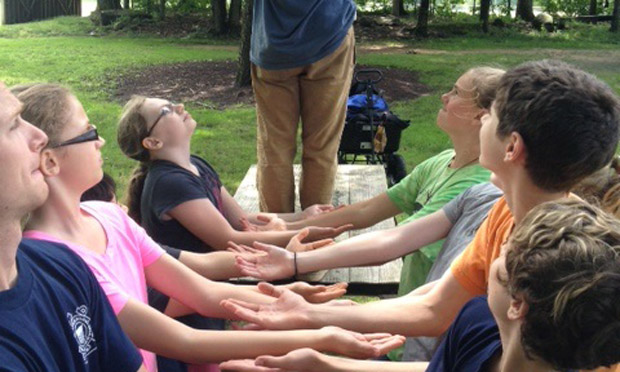As each U.S. election cycle rolls by, public life seems to grow more rancorous, frayed and fragmented, with the 2014 midterms being no exception. There is a palpable sense that something deeper is at work in America, some sea change in the underlying patterns of life, but is this valid?
Certainly, the pool of non-voters has generally grown over time and many traditional forms of civic engagement have waned and now see thinner participation. Income inequality and political polarization are frequently cited, but to what extent are those causes or effects? What other metrics and factors are useful to analyze?
Scholars have long noted that, at both the individual and the community level, trust is a vital component to a smoothly functioning society in terms of rule of law, economic exchange and other components of civic life. It is a key indicator of what’s often called “social capital.” Research on patterns in the United States has found that such trust is indeed in sharp decline, from faith in individuals and leaders, to trust in institutions. Over the past 40 years, public confidence in institutions has decreased significantly, according to a 2013 report from the General Social Survey, administered at the University of Chicago. Studies have also shown that trust in the nation’s leaders has been declining since the mid-2000s, across several different sectors. These trends have coincided with an increasingly gloomy outlook by the public on how the next generation will fare, according to numerous recent surveys.
Scholars are examining why these shifts are occurring, and they’re also contemplating the consequences of a further slide in these measures across American society. A 2014 study published in Psychological Science, “Declines in Trust in Others and Confidence in Institutions Among American Adults and Late Adolescents, 1972-2012,” analyzes data from the General Social Survey (GSS) of American adults, as well as the Monitoring the Future (MtF) survey of high school seniors. By using data from young respondents in the MtF, the researchers — Jean M. Twenge of San Diego State, and W. Keith Campbell and Nathan T. Carter of the University of Georgia — were able to examine not only overall decline in trust, but also generational and time-period effects. The scholars note that some prior research has argued that these declines are explained by generational differences. The study also examines the relationship between trust and various social and population indicators, such as income inequality, unemployment, crime and poverty.
The study’s findings include:
- Trust in other people has sharply declined since the 1970s, reaching historic lows in 2008 and in 2012. In 1972-74, 46% of American adults reported that they trusted most people. This dwindled to 33% in 2010-12. Conversely, 51% of American adults reported skepticism in others in 1972-74, increasing to 62% in 2010-12. These results were mirrored among high school seniors, whose trust in others dropped from 32% in 1976-78 to 18% in 2010-12.
- The decline in trust seems to be rooted in the current time period, rather than in generational differences, where no significant effect was found (i.e., Americans of all generations are losing trust).
- Confidence in institutions also hit an all-time low in 2012 for both adults and high school seniors, after highs in the late 1980s and early 2000s and lows in the early 1990s, late 2000s, and early 2010s, with trust in the military being the only notable exception. As with trust in others, there was a relatively low effect found for generational differences, with time period representing the strongest explanatory factor.
- When examining social indicators and population characteristics, the authors found that greater income inequality correlated with lower trust in others, and increases in poverty and crime were associated with lower confidence in institutions.
- The researchers also analyzed responses of “no opinion” from high school seniors — so as to gauge growing civic disengagement — and found a steady increase since the 1970s.
- Further, the scholars state, “the prediction that a ‘post-9/11 generation’ — the Millennials, born after 1982 — would bring a new revival of social capital … is not supported by these data. Both trust in others and confidence in institutions reached all-time lows among high school seniors in 2012; thus, recent Millennials were lower in social capital than Boomers or GenXers were at the same age.”
- Across the decades studied, “greater income inequality (as measured by the Gini index) predicted lower trust in others, and higher poverty, more violent crime, and an improving stock market predicted lower confidence in institutions.”
“Trust in others and confidence in institutions, two key indicators of social capital, reached historic lows among Americans in 2012 in two nationally representative surveys that have been administered since the 1970s,” the authors conclude. “Social capital was lower in recent years than during the Watergate scandal of the early 1970s; the Iran hostage crisis and ‘national malaise’ of the late 1970s and early 1980s; the height of the crime wave in the early 1990s; the Clinton impeachment of the late 1990s; the September 11, 2001, terrorist attacks; and the financial crisis and recession of the late 2000s.”
Given that “trust is crucial to social and societal functioning,” the authors contend that we have moved further toward an “America characterized by a deep sense of mistrust.”
Related research: As the above 2014 Psychological Science study notes, recent scholarship has found that individualism is on the rise in U.S. culture generally. For more evidence, see: “Birth Cohort Differences in Self-esteem, 1988–2008: A Cross-temporal Meta-analysis,” a 2010 study in the Review of General Psychology; and “The Changing Psychology of Culture from 1800 to 2000,” a 2013 study also published in Psychological Science.


Expert Commentary